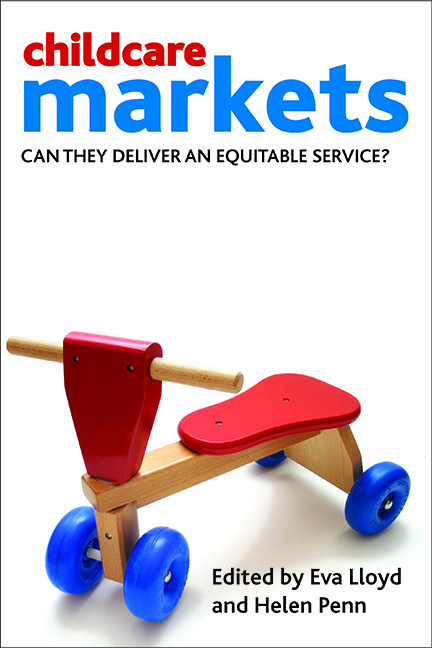one - Childcare markets: an introduction
Published online by Cambridge University Press: 01 September 2022
Summary
Introduction
The state's role in the provision of early childhood education and care (ECEC) services is of particular interest, since such services are closely linked to other social, educational, demographic and economic policy developments. Robust education systems, labour market policies which acknowledge the key contributions of women, family stability and ideas of inclusive citizenship all to an extent hinge on the provision of comprehensive and high quality early childhood education and care. This role requires states to strike a balance between serving the interests of parents and the wider family, of children and of the state itself. But negotiating the intersections between these policy interests is often conflictual (Archard, 2003; Kamerman and Moss, 2010). Agreeing and enabling a coherent mix of leave policies, financial support and childcare services, while also allowing for parental choice and achieving a satisfactory resolution to the macro-division of costs, may pose serious challenges for governments (Plantenga and Remery, 2009). One particular option for addressing these policy conundrums is the promotion of a market-based approach to the provision of early childhood education and care, the subject of this book.
Modern welfare states traditionally have varied in the amount of public support provided for early childhood education and care systems and in their response to economic challenges, such as the transition to post-industrialist economies and the rise of female labour market participation (Mahon, 2002). Viewed as a continuum, publicly supported universal systems in the Nordic countries (Rauhala, 2009) would be located at one end and at the opposite end would be provision in non-welfare states such as those in Sub-Saharan Africa (Prochner and Kabiru, 2008), almost entirely reliant on funding from private or supra-national agencies or NGOs.
Everywhere early childhood policies and systems appear in a state of flux, but in the present global economic climate childcare markets are a distinctive and rapidly growing phenomenon (Penn, 2009a). Compared to commodity markets, childcare markets tend to form part of a mixed economy, like other human services markets. In this mixed economy the state, private-for-profit and private-not-for-profit providers all play a role in the provision, funding and regulation of ECEC. Among the private-for-profit childcare providers that operate in such markets may be corporate businesses, whose primary commercial interest may lie elsewhere (Penn, 2011).
- Type
- Chapter
- Information
- Childcare MarketsCan They Deliver an Equitable Service?, pp. 3 - 18Publisher: Bristol University PressPrint publication year: 2012

